Module 8 Unit 1 外研版初中英语八年级下
文档属性
| 名称 | Module 8 Unit 1 外研版初中英语八年级下 |
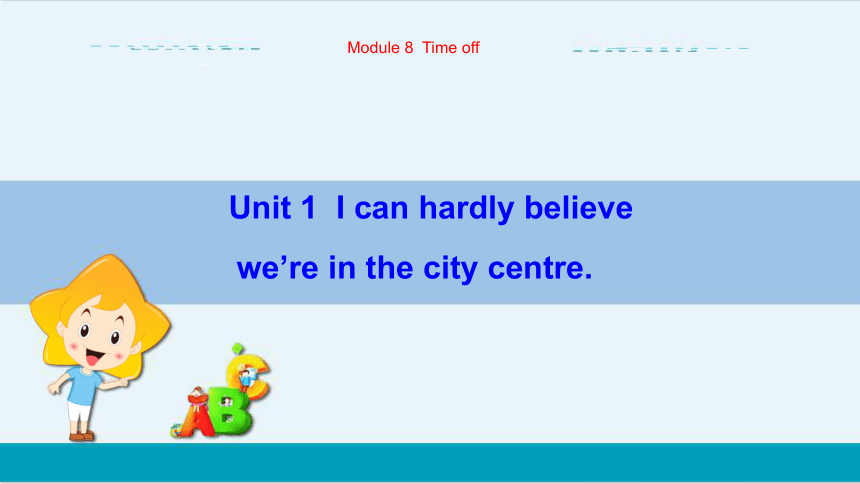
|
|
| 格式 | pptx | ||
| 文件大小 | 3.8MB | ||
| 资源类型 | 试卷 | ||
| 版本资源 | 外研版 | ||
| 科目 | 英语 | ||
| 更新时间 | 2024-02-21 19:33:46 | ||
图片预览

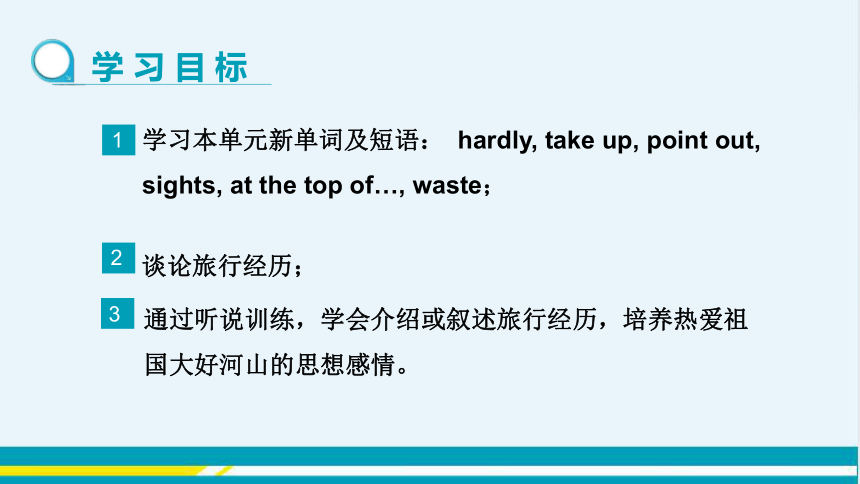
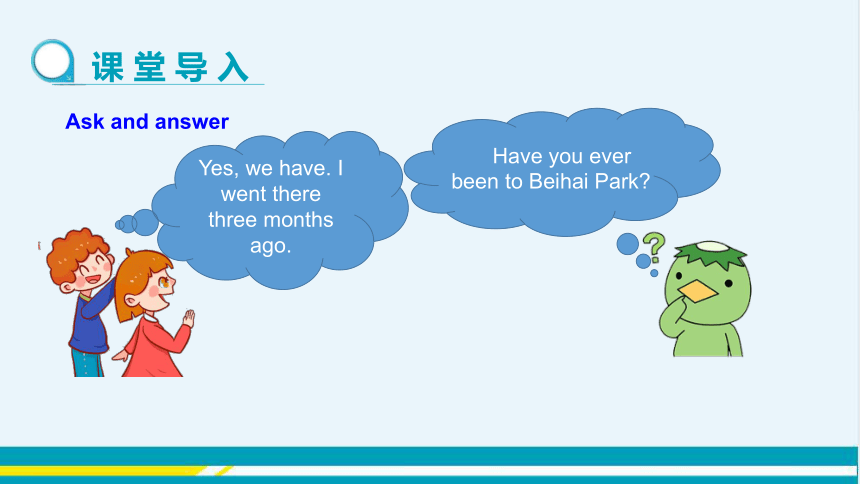
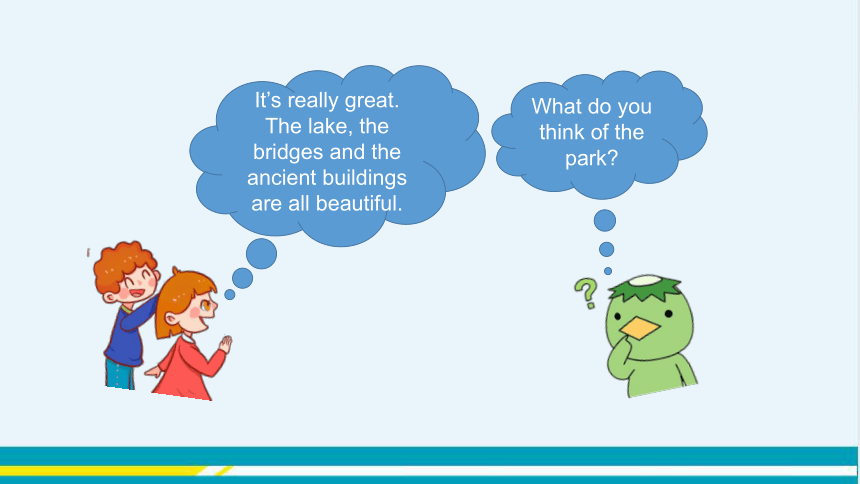
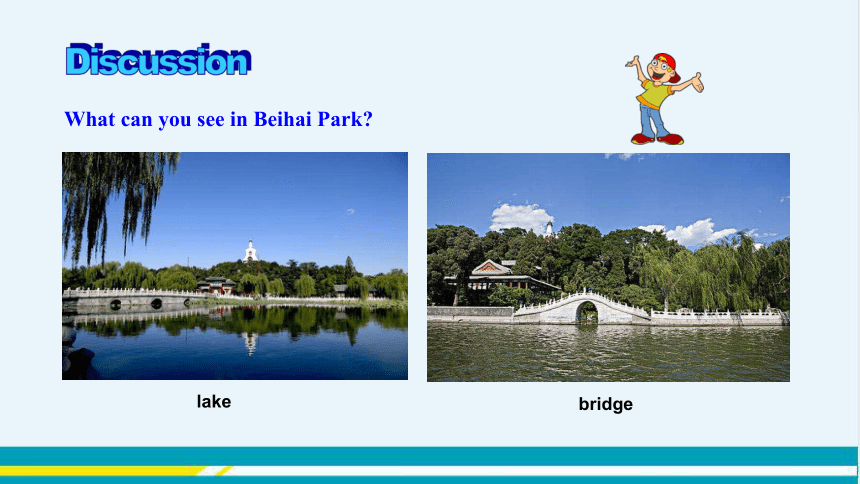
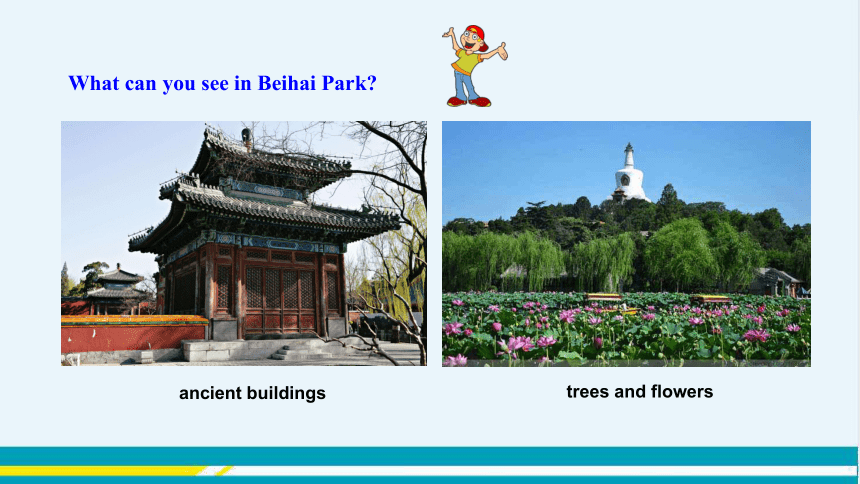
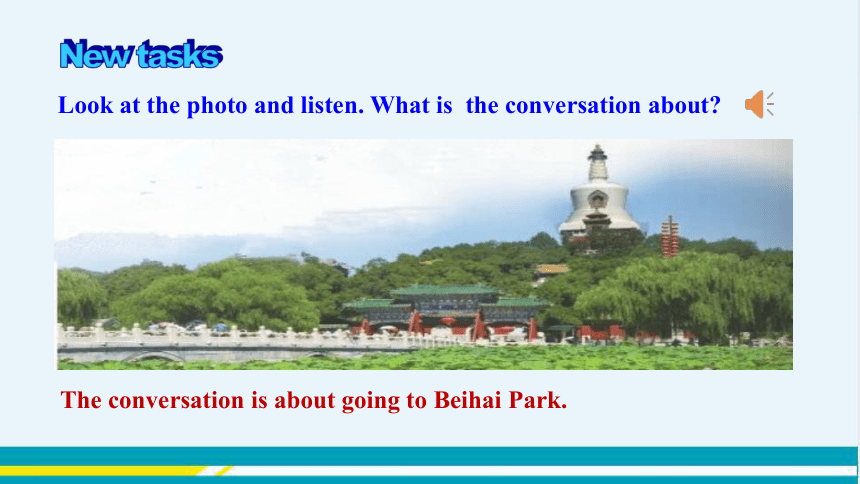
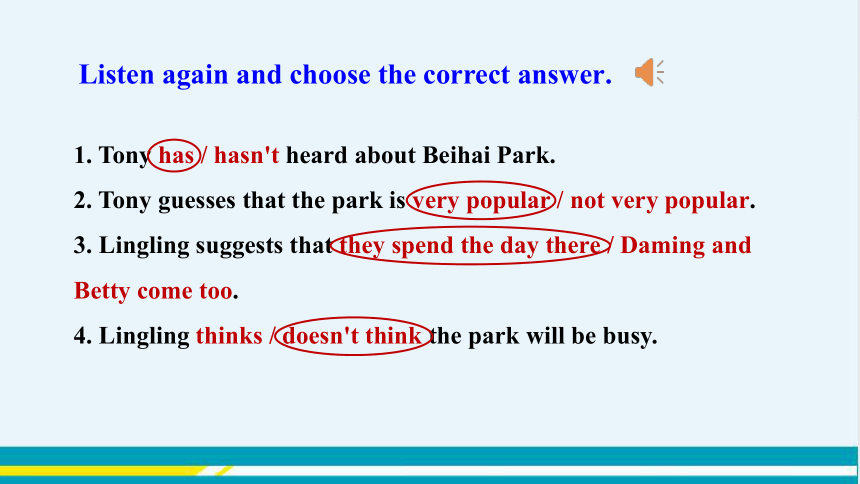
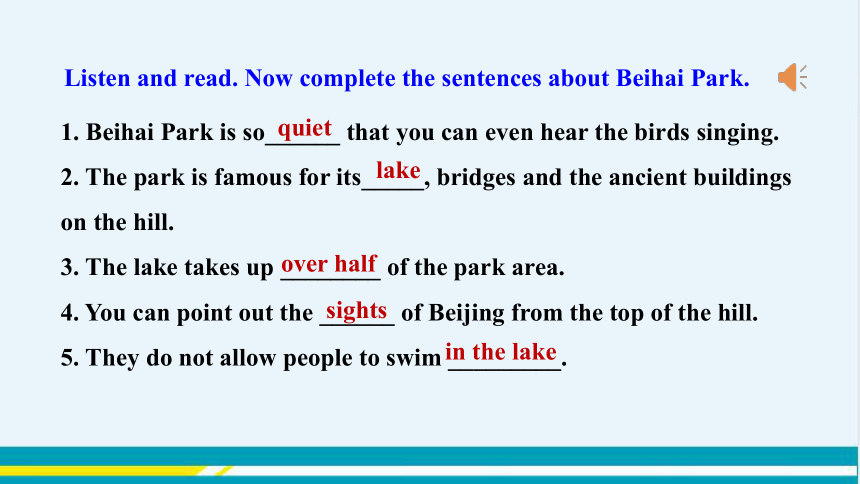
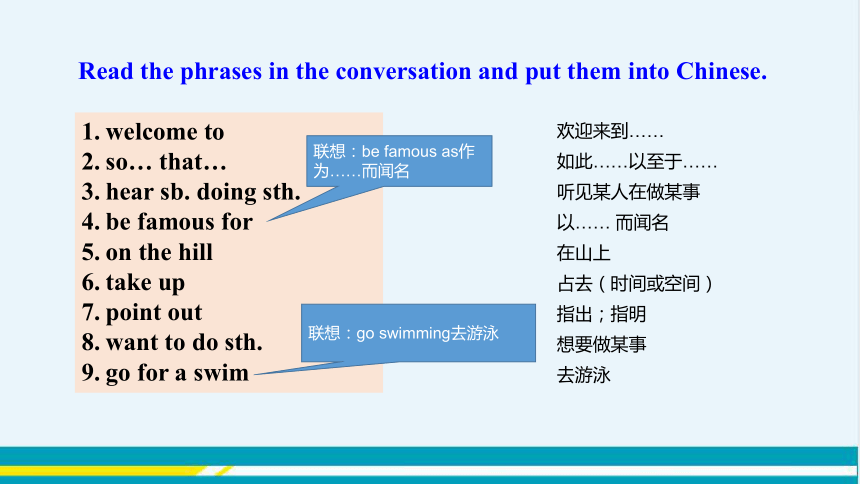
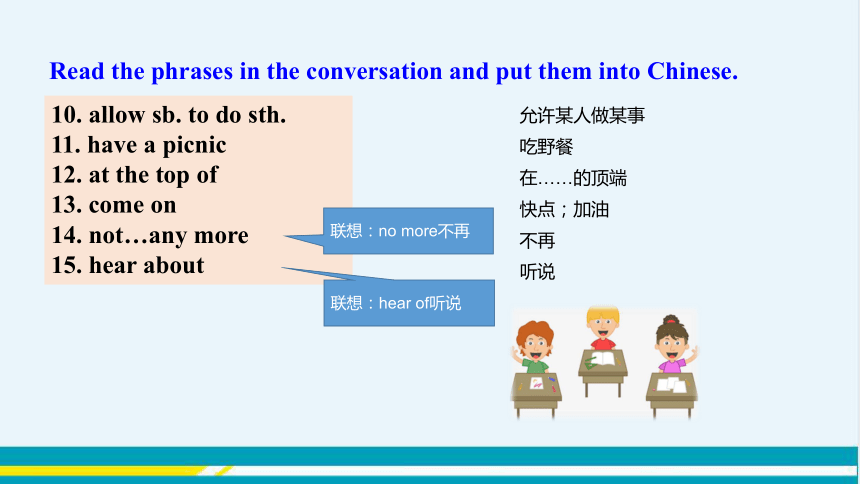
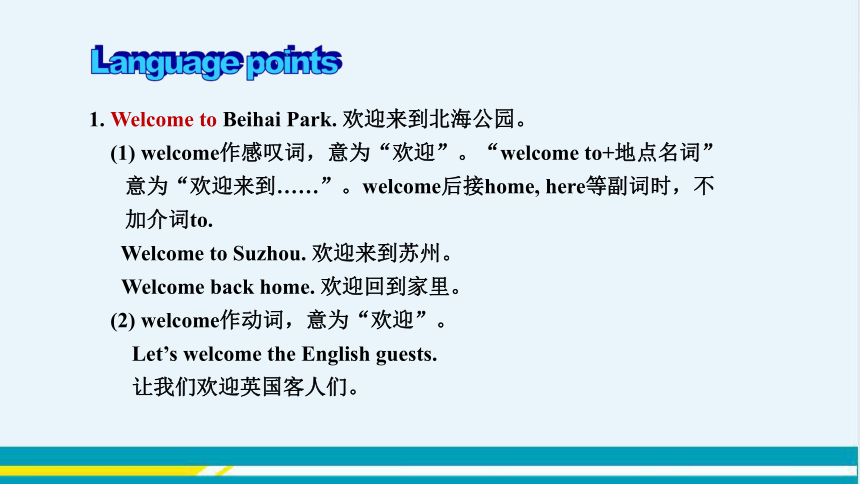
文档简介
(共32张PPT)
Unit 1 I can hardly believe
we’re in the city centre.
Module 8 Time off
__
学 习 目 标
学习本单元新单词及短语: hardly, take up, point out, sights, at the top of…, waste;
1
3
通过听说训练,学会介绍或叙述旅行经历,培养热爱祖国大好河山的思想感情。
谈论旅行经历;
2
课 堂 导 入
Have you ever been to Beihai Park
Yes, we have. I went there three months ago.
Ask and answer
What do you think of the park
It’s really great. The lake, the bridges and the ancient buildings are all beautiful.
What can you see in Beihai Park
Discussion
lake
bridge
What can you see in Beihai Park
ancient buildings
trees and flowers
Look at the photo and listen. What is the conversation about
The conversation is about going to Beihai Park.
New tasks
1. Tony has / hasn't heard about Beihai Park.
2. Tony guesses that the park is very popular / not very popular.
3. Lingling suggests that they spend the day there / Daming and Betty come too.
4. Lingling thinks / doesn't think the park will be busy.
Listen again and choose the correct answer.
Listen and read. Now complete the sentences about Beihai Park.
1. Beihai Park is so______ that you can even hear the birds singing.
2. The park is famous for its_____, bridges and the ancient buildings on the hill.
3. The lake takes up ________ of the park area.
4. You can point out the ______ of Beijing from the top of the hill.
5. They do not allow people to swim _________.
quiet
lake
over half
sights
in the lake
Read the phrases in the conversation and put them into Chinese.
欢迎来到……
如此……以至于……
听见某人在做某事
以…… 而闻名
welcome to
so… that…
hear sb. doing sth.
be famous for
on the hill
take up
point out
want to do sth.
go for a swim
在山上
占去(时间或空间)
指出;指明
想要做某事
去游泳
联想:be famous as作为……而闻名
联想:go swimming去游泳
允许某人做某事
吃野餐
在……的顶端
快点;加油
10. allow sb. to do sth.
11. have a picnic
12. at the top of
e on
14. not…any more
15. hear about
联想:no more不再
Read the phrases in the conversation and put them into Chinese.
不再
听说
联想:hear of听说
1. Welcome to Beihai Park. 欢迎来到北海公园。
(1) welcome作感叹词,意为“欢迎”。“welcome to+地点名词”意为“欢迎来到……”。welcome后接home, here等副词时,不加介词to.
Welcome to Suzhou. 欢迎来到苏州。
Welcome back home. 欢迎回到家里。
(2) welcome作动词,意为“欢迎”。
Let’s welcome the English guests.
让我们欢迎英国客人们。
Language points
(1)so... that...意为“如此……以至于……”,that引导结果状语从句。so后面跟形容词或副词,that后接从句。
It’s so hot that I can’t sleep well .天气如此热,以至于我睡不好觉。
(2)辨析:hear sb. doing sth.与hear sb. do sth.
I heard them reading English in the classroom. 我听到他们正在教室里读英语。
We often hear her play the piano.我们经常听到她弹钢琴。
2. It's so quiet here that I can even hear the birds singing!
这里如此安静以至于我甚至能听见鸟儿在歌唱!
hear sb. doing sht. 听见某人正在做某事 强调动作正在进行
hear sb. do sth. 听见某人做了某事 强调动作的过程
3. I can hardly believe we’re in the city centre.我几乎不能相信我在市中心。
hardly 副词,意为“几乎不;几乎没有”,本身表示否定含义,常位于连系动词、情态动词之后,实义动词之前。
It was so dark that I could hardly see anything.
光线太暗了,以至于我几乎什么也看不到。
There is hardly any food in the fridge. Let’s go and get some.
冰箱里几乎没有食物了,我们去买一些吧。
【注意】hardly并非hard的副词形式。hard作副词,意为“努力地”;作形容词,意为 “硬的;艰苦的” 。
My sister works so hard that she gets good grades.
我妹妹学习很努力,所以他取得了好成绩。
He lived a hard life. 他过着艰苦的生活。
4. This park is famous for its lake, bridges and the ancient buildings on the hill. 这个公园因为它的湖、桥和山上的古建筑而闻名。
China is famous for the Great Wall. 中国以长城而闻名。
His aunt is famous as a movie star. 他的姑姑作为一位影星而出名。
be famous for “因……而闻名”,相当于be known for for后接名词,表示出名的原因
be famous as “作为……而出名” as后接表示身份或职业的名词
5. The lake takes up over half of the park area.湖占据了这个公园面积的一半多。
(1)take up 意为“占用,花费(时间或空 间)”。
This desk takes up too much room.
这张桌子太占地方。
I know you are very busy. I don't want to take up too much of your time.
我知道你特别忙,不想占用你太多的时间。
(2) over副词,意为“多于;超过”,相当于more than。
I have learned over 2000 English words.
我已经学了2000多个英语单词了。
6. Then I can point out the sights of Beijing for you.然后我可以为你们指出北京的景点。
point out意为“指出;指明” 为“动词+副词”结构的短语,当人称代词作其宾语时,人称代词只能放在point与out之间。
I'll point him out to you next time he comes in.
他下次进来的时候,我指给你看。
Just now Mr Black pointed out all the mistakes.
刚才,王先生指出了所有的错误。
【拓展】point at/ to意为“指向;指着某人或某物”。
Tony pointed at a photo and said something.
托尼指着一张照片并说着什么。
7. I don‘t think they allow people to swim in the lake.我认为他们不允许人们在湖里游泳。
allow sb. to do sth. 意为“允许某人做 某事 ” ,动词不定式作宾语补足语。
His parents don’t allow him to go out at night.
他的父母不允许他晚上外出。
【拓展】allow doing sth.意为“允许做某事”。
They don’t allow smoking in this room.
他们不允许在这间屋子里抽烟。
8. Let’s not waste any more time.我们不要再浪费时间了。
waste此处作及物动词,意为“浪费,滥用”。
waste time/money in doing sth.意为“浪费时间或金钱做某事” 。
We shouldn’t waste water.
我们就应该浪费水。
She is always wasting time in playing computer games.
她总是浪费时间玩电脑游戏。
Read the sentences and answer the questions.
1. “I can hardly believe we’re in the city centre.”
Does Tony know they are in the city centre or not
hardly sights thirsty waste
Tony knows they are in the city centre.
Practice
2. “Then I can point out the sights of Beijing for you.”
Does Lingling want them to look at something or listen to something
Lingling wants them to look at something.
3. “I’m so hungry and thirsty.”
Does Daming want something to drink
Yes, he does.
4. “Let’s not waste any more time.”
Does Tony think they are spending their time well or badly
Tony thinks they are spending their time badly.
Listen and notice how the speaker pronounces the words.
1. It’s so quiet here that I can even hear the birds singing.
2. Let’s walk along the lake, cross the bridge and climb up the hill.
3. I don’t want to climb.
Now listen again and repeat.
Pronunciation and speaking
Work in pairs. Talk about a place of interest in your home town.
Student A: You’re a visitor from another country.
Student B: You’re introducing a place of interest in your home town to
student A. You can talk about:
where it is
what is special about it
how old it is
what is special about it
any other information you know about it
Use these expressions:
I guess (that)…
I’m sure (that)…
I know (that)…
I can’t believe (that)…
I think (that)…
I. 短语翻译。
1、听说 2、欢迎来到
3、如此…… 以至 4、因……而闻名
5、占据 6、指出;指明
7、去游泳 8、允许某人做某事
9、在…… 顶端 10、快点
11、不再 12、好吧
hear about
so…that…
take up
go for a swim
at the top of
not..any more
welcome to
be famous for
point out
allow sb. to do sth.
come on
all right
课 堂 达 标
II.单项填空
My parents didn’t allow me ______ to the party.
A. go B. to go C. going D. went
2. --- Why do people there ______ use umbrellas in the sun
--- Because they would rather enjoy the sunshine.
A. hardly B. usually C. always D. only
3. Joining a summer camp is a great chance _______ free time with your friends.
A. spend B. spending C. to spend D. to spending
B
A
C
4. I am very ______. Could you please get me some water
A. tired B. hungry C. angry D. thirsty
5. ______ is better for you to join the basketball club.
A. That B. It C. This D. One
6. It was raining ______ heavily ______ I got all wet in only a minute.
A. so; that B. too; to C. such; that D. as; as
7. --- Daming lost his schoolbag in the zoo yesterday.
--- ________.
A. Come on B. That’s too bad
C. I don’t think so D. How silly he is
D
B
A
B
1. This room is much ________ (cool) than that one.
2. It is a bad habit ________ (waste) food.
3. Mr Li’s office is on the third floor of the white ________ (build).
4. When I went past the classroom, I heard Jenny ________ (read) Chinese carefully.
5. I want ________ (take) some photos of the autumn leaves.
III. 用所给单词的适当形式填空。
cooler
building
to take
to waste
reading
1. 欢迎来到上海。(welcome)
____________________________________________________________
2. 咱们不要再浪费时间了。(waste)
____________________________________________________________
3. 你能指出这两副照片的不同之处吗?(point out)
____________________________________________________________
4. 潍坊因制做风筝而闻名。(be famous for)
____________________________________________________________
IV.用括号内所给的词或短语,将下面句子翻译成英语。
Welcome to Shanhai.
Can you point out the differences between the two pictures
Let’s not waste time any more .
Weifang is famous for making kites.
5. 他讲英语太快,以至于我没有理解。(so…that…)
_________________________________________________________
6. 我们将在山顶上吃野餐。(at the top of)
_________________________________________________________
7. 湖占据了这个公园面积的一半以上。(take up)
_________________________________________________________
8. 我们为什么不去游泳呢?(go for)
_________________________________________________________
He spoke English so fast that I couldn’t understand him.
We’ll have our picnic at the top of the hill.
The lake takes up over half of the park area.
Why don’t we go for a swim
1. Read the conversation.
2. Talk with your partner about a place you have ever been to.
Homework
Thank you !
Unit 1 I can hardly believe
we’re in the city centre.
Module 8 Time off
__
学 习 目 标
学习本单元新单词及短语: hardly, take up, point out, sights, at the top of…, waste;
1
3
通过听说训练,学会介绍或叙述旅行经历,培养热爱祖国大好河山的思想感情。
谈论旅行经历;
2
课 堂 导 入
Have you ever been to Beihai Park
Yes, we have. I went there three months ago.
Ask and answer
What do you think of the park
It’s really great. The lake, the bridges and the ancient buildings are all beautiful.
What can you see in Beihai Park
Discussion
lake
bridge
What can you see in Beihai Park
ancient buildings
trees and flowers
Look at the photo and listen. What is the conversation about
The conversation is about going to Beihai Park.
New tasks
1. Tony has / hasn't heard about Beihai Park.
2. Tony guesses that the park is very popular / not very popular.
3. Lingling suggests that they spend the day there / Daming and Betty come too.
4. Lingling thinks / doesn't think the park will be busy.
Listen again and choose the correct answer.
Listen and read. Now complete the sentences about Beihai Park.
1. Beihai Park is so______ that you can even hear the birds singing.
2. The park is famous for its_____, bridges and the ancient buildings on the hill.
3. The lake takes up ________ of the park area.
4. You can point out the ______ of Beijing from the top of the hill.
5. They do not allow people to swim _________.
quiet
lake
over half
sights
in the lake
Read the phrases in the conversation and put them into Chinese.
欢迎来到……
如此……以至于……
听见某人在做某事
以…… 而闻名
welcome to
so… that…
hear sb. doing sth.
be famous for
on the hill
take up
point out
want to do sth.
go for a swim
在山上
占去(时间或空间)
指出;指明
想要做某事
去游泳
联想:be famous as作为……而闻名
联想:go swimming去游泳
允许某人做某事
吃野餐
在……的顶端
快点;加油
10. allow sb. to do sth.
11. have a picnic
12. at the top of
e on
14. not…any more
15. hear about
联想:no more不再
Read the phrases in the conversation and put them into Chinese.
不再
听说
联想:hear of听说
1. Welcome to Beihai Park. 欢迎来到北海公园。
(1) welcome作感叹词,意为“欢迎”。“welcome to+地点名词”意为“欢迎来到……”。welcome后接home, here等副词时,不加介词to.
Welcome to Suzhou. 欢迎来到苏州。
Welcome back home. 欢迎回到家里。
(2) welcome作动词,意为“欢迎”。
Let’s welcome the English guests.
让我们欢迎英国客人们。
Language points
(1)so... that...意为“如此……以至于……”,that引导结果状语从句。so后面跟形容词或副词,that后接从句。
It’s so hot that I can’t sleep well .天气如此热,以至于我睡不好觉。
(2)辨析:hear sb. doing sth.与hear sb. do sth.
I heard them reading English in the classroom. 我听到他们正在教室里读英语。
We often hear her play the piano.我们经常听到她弹钢琴。
2. It's so quiet here that I can even hear the birds singing!
这里如此安静以至于我甚至能听见鸟儿在歌唱!
hear sb. doing sht. 听见某人正在做某事 强调动作正在进行
hear sb. do sth. 听见某人做了某事 强调动作的过程
3. I can hardly believe we’re in the city centre.我几乎不能相信我在市中心。
hardly 副词,意为“几乎不;几乎没有”,本身表示否定含义,常位于连系动词、情态动词之后,实义动词之前。
It was so dark that I could hardly see anything.
光线太暗了,以至于我几乎什么也看不到。
There is hardly any food in the fridge. Let’s go and get some.
冰箱里几乎没有食物了,我们去买一些吧。
【注意】hardly并非hard的副词形式。hard作副词,意为“努力地”;作形容词,意为 “硬的;艰苦的” 。
My sister works so hard that she gets good grades.
我妹妹学习很努力,所以他取得了好成绩。
He lived a hard life. 他过着艰苦的生活。
4. This park is famous for its lake, bridges and the ancient buildings on the hill. 这个公园因为它的湖、桥和山上的古建筑而闻名。
China is famous for the Great Wall. 中国以长城而闻名。
His aunt is famous as a movie star. 他的姑姑作为一位影星而出名。
be famous for “因……而闻名”,相当于be known for for后接名词,表示出名的原因
be famous as “作为……而出名” as后接表示身份或职业的名词
5. The lake takes up over half of the park area.湖占据了这个公园面积的一半多。
(1)take up 意为“占用,花费(时间或空 间)”。
This desk takes up too much room.
这张桌子太占地方。
I know you are very busy. I don't want to take up too much of your time.
我知道你特别忙,不想占用你太多的时间。
(2) over副词,意为“多于;超过”,相当于more than。
I have learned over 2000 English words.
我已经学了2000多个英语单词了。
6. Then I can point out the sights of Beijing for you.然后我可以为你们指出北京的景点。
point out意为“指出;指明” 为“动词+副词”结构的短语,当人称代词作其宾语时,人称代词只能放在point与out之间。
I'll point him out to you next time he comes in.
他下次进来的时候,我指给你看。
Just now Mr Black pointed out all the mistakes.
刚才,王先生指出了所有的错误。
【拓展】point at/ to意为“指向;指着某人或某物”。
Tony pointed at a photo and said something.
托尼指着一张照片并说着什么。
7. I don‘t think they allow people to swim in the lake.我认为他们不允许人们在湖里游泳。
allow sb. to do sth. 意为“允许某人做 某事 ” ,动词不定式作宾语补足语。
His parents don’t allow him to go out at night.
他的父母不允许他晚上外出。
【拓展】allow doing sth.意为“允许做某事”。
They don’t allow smoking in this room.
他们不允许在这间屋子里抽烟。
8. Let’s not waste any more time.我们不要再浪费时间了。
waste此处作及物动词,意为“浪费,滥用”。
waste time/money in doing sth.意为“浪费时间或金钱做某事” 。
We shouldn’t waste water.
我们就应该浪费水。
She is always wasting time in playing computer games.
她总是浪费时间玩电脑游戏。
Read the sentences and answer the questions.
1. “I can hardly believe we’re in the city centre.”
Does Tony know they are in the city centre or not
hardly sights thirsty waste
Tony knows they are in the city centre.
Practice
2. “Then I can point out the sights of Beijing for you.”
Does Lingling want them to look at something or listen to something
Lingling wants them to look at something.
3. “I’m so hungry and thirsty.”
Does Daming want something to drink
Yes, he does.
4. “Let’s not waste any more time.”
Does Tony think they are spending their time well or badly
Tony thinks they are spending their time badly.
Listen and notice how the speaker pronounces the words.
1. It’s so quiet here that I can even hear the birds singing.
2. Let’s walk along the lake, cross the bridge and climb up the hill.
3. I don’t want to climb.
Now listen again and repeat.
Pronunciation and speaking
Work in pairs. Talk about a place of interest in your home town.
Student A: You’re a visitor from another country.
Student B: You’re introducing a place of interest in your home town to
student A. You can talk about:
where it is
what is special about it
how old it is
what is special about it
any other information you know about it
Use these expressions:
I guess (that)…
I’m sure (that)…
I know (that)…
I can’t believe (that)…
I think (that)…
I. 短语翻译。
1、听说 2、欢迎来到
3、如此…… 以至 4、因……而闻名
5、占据 6、指出;指明
7、去游泳 8、允许某人做某事
9、在…… 顶端 10、快点
11、不再 12、好吧
hear about
so…that…
take up
go for a swim
at the top of
not..any more
welcome to
be famous for
point out
allow sb. to do sth.
come on
all right
课 堂 达 标
II.单项填空
My parents didn’t allow me ______ to the party.
A. go B. to go C. going D. went
2. --- Why do people there ______ use umbrellas in the sun
--- Because they would rather enjoy the sunshine.
A. hardly B. usually C. always D. only
3. Joining a summer camp is a great chance _______ free time with your friends.
A. spend B. spending C. to spend D. to spending
B
A
C
4. I am very ______. Could you please get me some water
A. tired B. hungry C. angry D. thirsty
5. ______ is better for you to join the basketball club.
A. That B. It C. This D. One
6. It was raining ______ heavily ______ I got all wet in only a minute.
A. so; that B. too; to C. such; that D. as; as
7. --- Daming lost his schoolbag in the zoo yesterday.
--- ________.
A. Come on B. That’s too bad
C. I don’t think so D. How silly he is
D
B
A
B
1. This room is much ________ (cool) than that one.
2. It is a bad habit ________ (waste) food.
3. Mr Li’s office is on the third floor of the white ________ (build).
4. When I went past the classroom, I heard Jenny ________ (read) Chinese carefully.
5. I want ________ (take) some photos of the autumn leaves.
III. 用所给单词的适当形式填空。
cooler
building
to take
to waste
reading
1. 欢迎来到上海。(welcome)
____________________________________________________________
2. 咱们不要再浪费时间了。(waste)
____________________________________________________________
3. 你能指出这两副照片的不同之处吗?(point out)
____________________________________________________________
4. 潍坊因制做风筝而闻名。(be famous for)
____________________________________________________________
IV.用括号内所给的词或短语,将下面句子翻译成英语。
Welcome to Shanhai.
Can you point out the differences between the two pictures
Let’s not waste time any more .
Weifang is famous for making kites.
5. 他讲英语太快,以至于我没有理解。(so…that…)
_________________________________________________________
6. 我们将在山顶上吃野餐。(at the top of)
_________________________________________________________
7. 湖占据了这个公园面积的一半以上。(take up)
_________________________________________________________
8. 我们为什么不去游泳呢?(go for)
_________________________________________________________
He spoke English so fast that I couldn’t understand him.
We’ll have our picnic at the top of the hill.
The lake takes up over half of the park area.
Why don’t we go for a swim
1. Read the conversation.
2. Talk with your partner about a place you have ever been to.
Homework
Thank you !
同课章节目录
- Module 1 Feelings and impressions
- Unit 1 It smells delicious.
- Unit 2 I feel nervous when I speak Chinese .
- Unit 3 Language in use
- Module 2 Experiences
- Unit 1 I've also entered lots of speaking competi
- Unit 2 They have seen the Pyramids.
- Unit 3 Language in use
- Module 3 Journey to space
- Unit 1 Has it arrived yet?
- Unit 2 We have not found life on any other planet
- Unit 3 Language in use
- Module 4 Seeing the docto
- Unit 1 I haven't done much exercise since I got m
- Unit 2 We have played football for a year now
- Unit 3 Language in use
- Module 5 Cartoons
- Unit 1 It's time to watch a cartoon.
- Unit 2 Tintin has been popular for over eighty yea
- Unit 3 Language in use
- Revision module A
- Module 6 Hobbies
- Unit 1 Do you collect anything ?
- Unit 2 Hobbies can make you grow as a person.
- Unit 3 Language in use
- Module 7 Summer in Los Angeles
- Unit 1 Please write to me and send me some photos
- Unit 2 Fill out a form and come to learn English
- Unit 3 Language in use
- Module 8 Time off
- Unit 1 I can hardly believe we are in the city ce
- Unit 2 We thought somebody was moving about
- Unit 3 Language in use
- Module 9 Friendship
- Unit 1 Could I ask if you've mentioned this to he
- Unit 2 I believe that the world is what you think
- Unit 3 Language in use
- Module 10 On the radio
- Unit 1 I hope that you can join us one day
- Unit 2 It seemed that they were speaking to me in
- Unit 3 Language in use
- Revision module B
